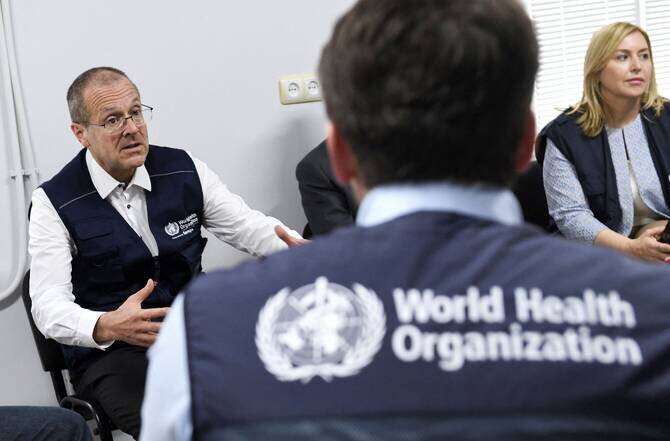
Europe Must Enhance Healthcare Management Post-US Aid Cuts: WHO
WHO Europe's director emphasizes the need for health resource optimization following significant funding reductions.
COPENHAGEN: The World Health Organization (WHO) European region faces a critical juncture as drastic aid cuts, particularly from the United States, necessitate more efficient healthcare management within the continent.
Dr. Hans Kluge, director of WHO Europe, highlighted this challenge in an interview with AFP just before the 53-country regional meeting of the organization.
Since US President Donald Trump's inauguration in January, there has been a marked reduction in US international aid, leading to the dismantling of USAID, the world’s largest humanitarian aid agency.
Kluge underscored that several key contributors, including Britain, France, and Germany, alongside the United States, have significantly decreased their contributions to the WHO, putting its operations at risk.
Despite a 20% budget cut, WHO Europe aims to strengthen its role within European health administrations by reorganizing and prioritizing its missions.
Kluge envisions a future where WHO Europe is "healthier, stronger, trusted, evidence-based, and politically neutral".
The organization faces dual challenges: managing immediate crises such as war or natural disasters while maintaining essential public health programs.
This approach was informed by lessons learned from the Covid-19 pandemic.
Ukraine exemplifies a regional focus on defense over healthcare needs, illustrating a broader issue where European efforts are not adequately addressing health concerns in favor of other priorities.
Mental health issues, exacerbated by conflict, isolation, and post-pandemic trauma, affect one-sixth of Europe's population and one-fifth of children, according to WHO statistics.
Regional trends include rising youth addiction rates, inadequate online protection for minors, climate change impacts, and a growing prevalence of non-infectious diseases.
WHO Europe plans to concentrate its limited resources on addressing these pressing issues.
Vaccination remains crucial; however, in 2023, there were 366,000 children worldwide who had not received any vaccinations.
This number increased to 440,000 by 2024 due to logistical challenges, costs, and a lack of healthcare personnel, compounded by widespread misinformation about vaccines.
Kluge stressed that vaccination is the most cost-effective public health tool, emphasizing the need to preserve its effectiveness.
Prevention is key to maintaining Europeans' health, with WHO Europe projecting a sevenfold return on investment in preventive measures for every euro spent.
Kluge concluded by calling on Europe to take responsibility for its own healthcare needs.
Dr. Hans Kluge, director of WHO Europe, highlighted this challenge in an interview with AFP just before the 53-country regional meeting of the organization.
Since US President Donald Trump's inauguration in January, there has been a marked reduction in US international aid, leading to the dismantling of USAID, the world’s largest humanitarian aid agency.
Kluge underscored that several key contributors, including Britain, France, and Germany, alongside the United States, have significantly decreased their contributions to the WHO, putting its operations at risk.
Despite a 20% budget cut, WHO Europe aims to strengthen its role within European health administrations by reorganizing and prioritizing its missions.
Kluge envisions a future where WHO Europe is "healthier, stronger, trusted, evidence-based, and politically neutral".
The organization faces dual challenges: managing immediate crises such as war or natural disasters while maintaining essential public health programs.
This approach was informed by lessons learned from the Covid-19 pandemic.
Ukraine exemplifies a regional focus on defense over healthcare needs, illustrating a broader issue where European efforts are not adequately addressing health concerns in favor of other priorities.
Mental health issues, exacerbated by conflict, isolation, and post-pandemic trauma, affect one-sixth of Europe's population and one-fifth of children, according to WHO statistics.
Regional trends include rising youth addiction rates, inadequate online protection for minors, climate change impacts, and a growing prevalence of non-infectious diseases.
WHO Europe plans to concentrate its limited resources on addressing these pressing issues.
Vaccination remains crucial; however, in 2023, there were 366,000 children worldwide who had not received any vaccinations.
This number increased to 440,000 by 2024 due to logistical challenges, costs, and a lack of healthcare personnel, compounded by widespread misinformation about vaccines.
Kluge stressed that vaccination is the most cost-effective public health tool, emphasizing the need to preserve its effectiveness.
Prevention is key to maintaining Europeans' health, with WHO Europe projecting a sevenfold return on investment in preventive measures for every euro spent.
Kluge concluded by calling on Europe to take responsibility for its own healthcare needs.











